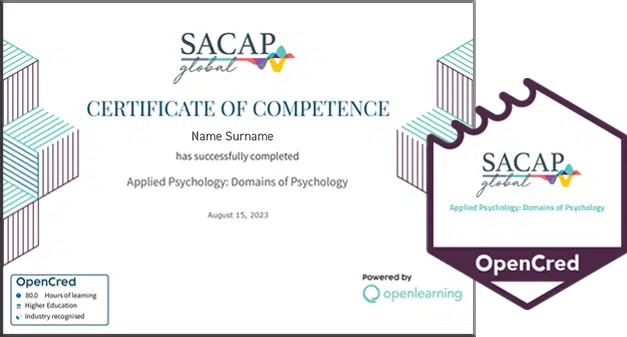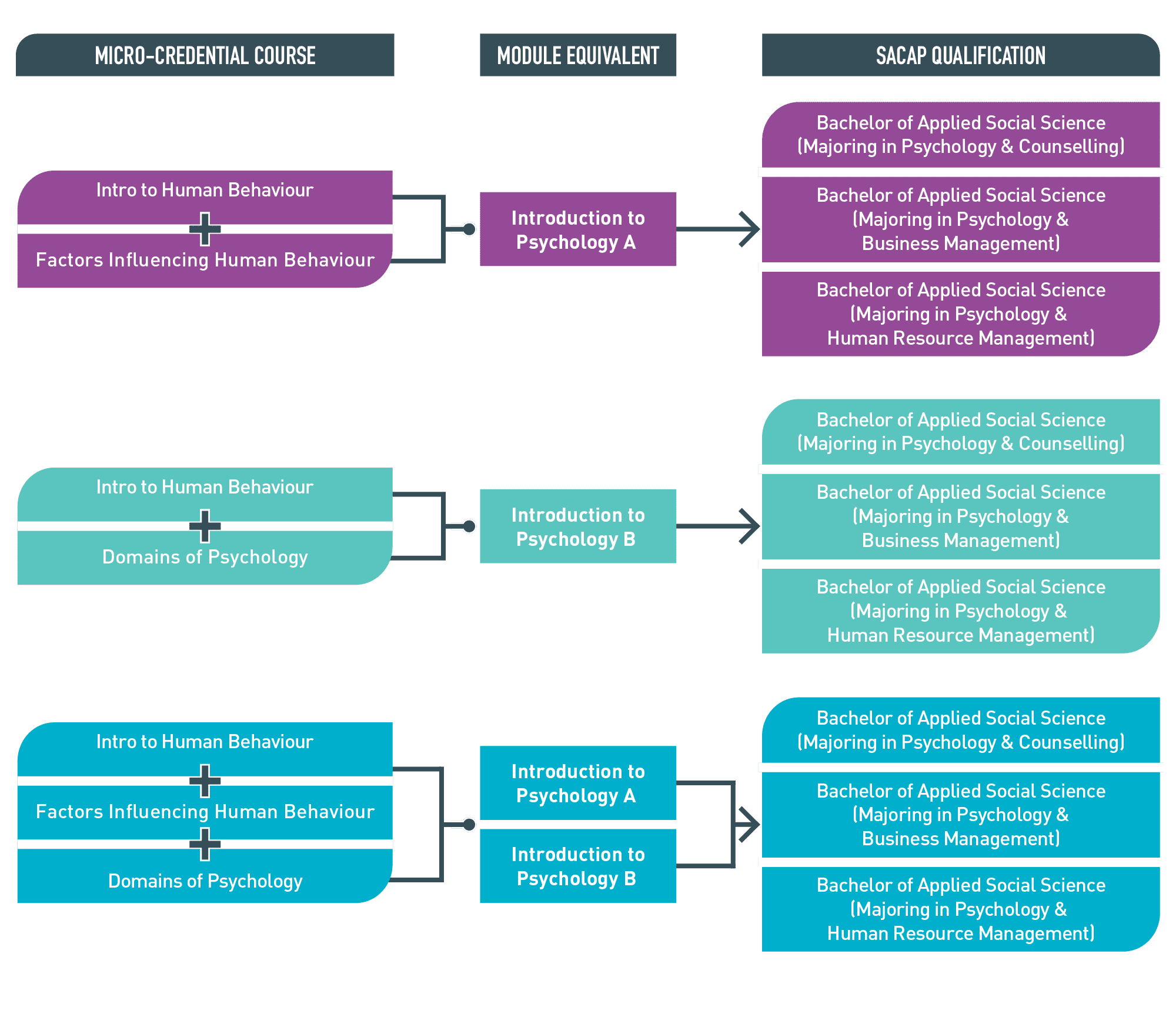Domains of Psychology
R6,160.00

Course Overview
Explore nine core domains of psychology to understand the human mind and human behaviour.
The Domains of Psychology micro-credential will help you understand the significance of biological and neuropsychological functioning of the human mind and body.
In this 8-week course, you will examine learning theories of classical and operant conditioning, as well as social learning theory.
Gain a basic understanding of cognitive psychology: thinking, learning, language, and intelligence. Explore the differences between sensation and perception and how sensory information is interpreted by the brain.
During this course you will reflect upon theories of social influence and famous social experiments. Build an understanding of industrial and organisational (I/O) psychology that is primarily practiced in workplace settings.
This micro-credential course also focuses on psychological disorders and factors that influence community mental health. Lastly, learn about social science research and its place within the field of psychology and explore the importance of good research practices.
FAQs
What are the entry requirements?
Anyone 18 years of age or older can sign up for this micro-credential course. There are no academic entry requirements or conditions.
Who is this course for?
This course is for anyone interested in an introduction to the field of psychology, as a broad range of domains in psychology is explored.
What is the time commitment?
A total of 80 hours is required to complete the micro-credential course. An average of 10 hours weekly over 8 weeks.
What do you need to do the course?
- Access to Microsoft Word
- Google Chrome (recommended)
- Stable internet connection
Is the course accredited?
The micro-credential course is not accredited and non-credit bearing.
What is applied psychology?
Applied psychology is a broad field. To understand it better, we can start by understanding some of its broader domains, which include various ways of applying psychological theory and research to real-life situations. Read more here.
Course highlights

-
Cover the key domains of psychological investigation and practice.
-
Explore internal and external forces that define human thinking and behaviour.
-
Examine prevention practices that positively influence individual and community mental health.
Dates
Class of 2025 October: 6 October – 30 November
There are no online classes. Course content is released on a weekly basis allowing you to work through course material, and meet weekly targets, at a time that is most convenient to you.
Learner Experience
Certification
Upon completion, you will receive a digital certificate of competence and badge. Your certificate and badge can be shared on 100+ social media platforms, allowing you to share your achievement with a single click.

Credential Type
The OpenLearning team has reviewed this course to ensure quality academic learning within the Malaysian and Australian credentialing framework.
An OpenLearning OpenCred is a type of credential that can stand-alone, or interact with a formal qualification. OpenCred courses are market-leading online courses that prepare learners for the future of work.
This course has been designed and developed by experts in the field of psychology. The Domains of Psychology micro-credential is for anyone needing to upskill in this area and offers 80 hours of learning and assessment.
Learners study online with peers and receive robust academic content while acquiring practical industry-relevant skills.
OpenCreds
Completing this course leads to obtaining an OpenCred.
- 80 hours of learning
- OpenCred classification: Pathway
Stackable Credentials
Stack specified combinations of micro-credentials and they can be recognised as equivalent to a module within the Bachelor of Applied Social Science Degree at SACAP. Intro to Human Behaviour can be stacked with Factors Influencing Human Behaviour and Domains of Psychology and if you meet the minimum entrance criteria, you can enrol for the Bachelor of Applied Social Science Degree and apply for module exemption.

What You’ll Learn
Over the course of eight (8) weeks, through videos, readings and discussions, you will explore the following topics:
- Week 1: Biological and Neuropsychology.
- Week 2: The Biology of Sensation and Perception.
- Week 3: Behavioural Psychology (also known as “Behaviourism”).
- Week 4: Cognitive Psychology.
- Week 5: Social Psychology.
- Week 6: Organisational Psychology.
- Week 7: Psychopathology and Community mental health.
- Week 8: Social Science Research and Summative Assessment.
Course Outcomes
By the end of this course you will be able to:
- Describe the field of Biological and Neuropsychology.
- Examine the sensory pathways of the body and differentiate Sensation from Perception.
- Explain theories of Behavioural psychology with a focus upon theories of classical and operant conditioning, and Social Learning Theory (SLT).
- Identify theories of Cognitive psychology with a focus upon thinking, learning, language, and intelligence.
- Identify theories in social psychology that examine social influences upon human behaviour.
- Define the field of Organisational and Industrial (I/O) psychology, and the settings in which they are practiced.
- Describe the field of Psychopathology together with an overview of psychological disorders and gain some insight into community factors that influence individual and community mental health.
- Explain the importance of good research and its place within the field of psychology.
The Team
The SACAP Global team brings a wealth of knowledge and practical experience across various disciplines. Our expert short course developers and dedicated support team are passionate about sharing their insights to help you get the most out of your online learning journey.



























